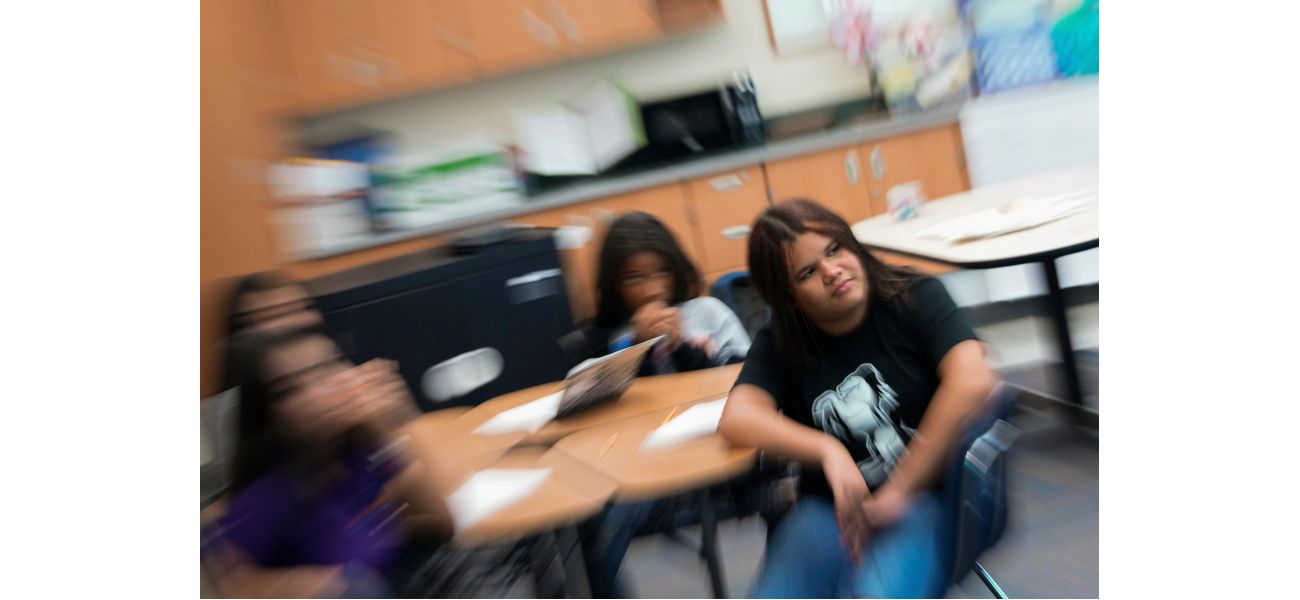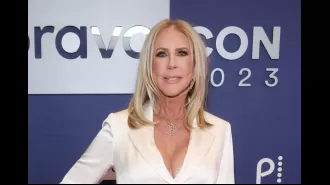Immigrants sought a better life and education in America, but the outcome varied.
Families seeking a brighter future now question if this is a suitable place to raise their kids.
October 27th 2024.

Alisson Ramirez was excited yet nervous when she started seventh grade at her first American school. She was facing the challenge of taking classes that were taught entirely in English, a language she was still trying to master. As a Venezuelan teen, she was also worried about being rejected by her classmates and feeling lost in a new country.
Her fears stemmed from the fact that she was still learning English and was afraid of being judged for not being able to answer questions in the language. She was also afraid to speak Spanish in front of her classmates, as she thought she would be perceived as different or inferior.
However, to her surprise, her first day at Aurora Public Schools in Colorado was not as daunting as she thought it would be. Many of her teachers made an effort to translate important vocabulary into Spanish and provided written instructions in her native language. Some teachers even asked her if she was done with her work or if she had any questions in Spanish. One of her teachers even promised to study Spanish to better support Alisson.
This made Alisson feel more at ease and welcomed in her new school. But outside of the classrooms, it was a different story. While the school system was trying to accommodate the influx of over 3,000 new students from Venezuela and Colombia, the city government had a different approach. They tried to discourage Venezuelan immigrants from moving to Aurora by refusing to spend any money on helping them settle in. They even planned to investigate the nonprofits that were assisting migrants in the Denver suburb.
Things were made worse when the mayor of Aurora started spreading false claims about Venezuelan gangs taking over the city. These claims were then amplified by former president and current GOP candidate, Donald Trump, during his campaign rallies. He even went as far as calling Aurora a "war zone" and claiming that immigrants were "poisoning" schools with diseases and not speaking English.
Trump also promised that if he was elected, Aurora would be one of the first places he would launch his program to deport migrants. This was the harsh reality for newcomers to the United States in 2024, a country that was once known as the land of opportunity but now seemed divided and unwelcoming.
For many migrants, their journey to the U.S. was in search of a better life for their families. However, upon arriving in this polarized country, they found themselves bewildered by its divisions. They now questioned if this was a good place to raise their children, especially with the rumors and discrimination they faced.
For Alisson's family, it wasn't clear that they were living in a separate city called Aurora, with its own government and policies that were different from neighboring Denver and other suburbs. All they knew was that some organizations and churches were willing to help, but some people were afraid of them and their family.
This fear became apparent to Alisson's mother, Maria Angel Torres, when she went to the grocery store and was told by a teen speaking Spanish with an American accent to keep her distance. This was just one example of the discrimination and mistreatment they faced on a daily basis.
Torres was also confused when the mayor and Trump started talking about Venezuelan gangs taking over the city. She didn't believe that this was true, but she was worried about the effect it would have on her family's reputation. They had left Venezuela to escape violence and lawlessness, and they didn't want it to follow them to their new home.
Apart from Alisson, Torres also had an older daughter and her partner who had fled Venezuela due to similar threats and violence. They now had deportation hearings in 2025, where they would have to plead their case for asylum. In the meantime, they had settled in Aurora after hearing about the Denver area from a family who had helped them on their journey.
When they first arrived in Aurora, Torres and her daughter tried to enroll their kids in school but were unsure about the vaccination requirements. This resulted in Alisson and her brother staying home for months until they were able to start school in the fall. Both Torres and her daughter hoped that the instruction would be in English, believing that it would help their children learn the language faster.
It was Alisson Ramirez's first day of seventh grade at an American school, and she was feeling anxious and uncertain. Coming from Venezuela, she was now facing classes taught entirely in English, and she was worried about not being able to understand and communicate with her teachers and classmates. The thought of being rejected and feeling lost for months was daunting for the 13-year-old.
Alisson's biggest fear was not being able to answer questions in English and feeling ashamed to respond in her native Spanish. But to her surprise, on her first day at Aurora Public Schools in Colorado, many of her teachers translated important vocabulary into Spanish and even handed out written instructions in her native language. Some teachers even asked her if she had any questions or if she was finished with her work in Spanish. It was a relief for Alisson, and she felt supported and understood by her teachers.
However, outside of the classroom, the situation was different. While the school system was making efforts to accommodate the influx of over 3,000 new students from Venezuela and Colombia, the city government was taking the opposite approach. They were not willing to provide any financial assistance to the newcomers, and they even planned to investigate the non-profit organizations that were helping these immigrants settle in the Denver suburb.
Unfortunately, the discrimination and fear towards immigrants in Aurora didn't stop there. The city's mayor, Mike Coffman, spread unfounded claims about Venezuelan gangs taking over an apartment complex in the city. These claims were then magnified by former president and current GOP candidate, Donald Trump, during his campaign rallies. He even referred to Aurora as a "war zone" and accused immigrants of "poisoning" the schools and bringing disease into the country. It was a difficult and confusing time for the immigrants who came to the United States looking for a better life for their families.
Alisson's family, like many other immigrants, were not aware that Aurora was a separate city with its own government and policies, different from the neighboring city of Denver. Alisson's mother, Maria Angel Torres, 43, often felt the fear and rejection from the locals while running errands or looking for work. She was even told to keep her distance by a teenage girl who spoke Spanish with an American accent, while standing in line at a grocery store.
This discrimination and fear towards immigrants in Aurora was especially hurtful for Torres, who had fled Venezuela with her family to escape the lawlessness and violence in their home country. Her daughter Gabriela Ramirez, 27, and her partner Ronexi Bocaranda, 37, had owned a food truck in Venezuela, but they were forced to pay a bribe known as "vacuna" to government workers for protection from harassment. When they refused to pay, Bocaranda was stabbed in the arm, and they were threatened with death. Fearing for their lives, the family fled to Colombia and eventually made their way to the United States.
Torres and her family arrived in Aurora in February, and they immediately tried to enroll their children in school. However, they were confused about the vaccination requirements and whether their children could use the vaccinations they received in Venezuela and Colombia. After months of staying at home, Alisson and her brother Dylan finally started school in the fall. Alisson's mother and sister hoped that the instruction would be in English, as they believed it would help their children learn the language faster.
Times had changed in Aurora since the arrival of the immigrants. The city had become more divided and polarized, and the newcomers found themselves caught in the middle. Many of them had come to the United States in search of a better life for their families, but now they were questioning whether this was even a good place to raise their children. The rumors and discrimination made it even harder for them to adjust and feel welcomed in their new home.
Her fears stemmed from the fact that she was still learning English and was afraid of being judged for not being able to answer questions in the language. She was also afraid to speak Spanish in front of her classmates, as she thought she would be perceived as different or inferior.
However, to her surprise, her first day at Aurora Public Schools in Colorado was not as daunting as she thought it would be. Many of her teachers made an effort to translate important vocabulary into Spanish and provided written instructions in her native language. Some teachers even asked her if she was done with her work or if she had any questions in Spanish. One of her teachers even promised to study Spanish to better support Alisson.
This made Alisson feel more at ease and welcomed in her new school. But outside of the classrooms, it was a different story. While the school system was trying to accommodate the influx of over 3,000 new students from Venezuela and Colombia, the city government had a different approach. They tried to discourage Venezuelan immigrants from moving to Aurora by refusing to spend any money on helping them settle in. They even planned to investigate the nonprofits that were assisting migrants in the Denver suburb.
Things were made worse when the mayor of Aurora started spreading false claims about Venezuelan gangs taking over the city. These claims were then amplified by former president and current GOP candidate, Donald Trump, during his campaign rallies. He even went as far as calling Aurora a "war zone" and claiming that immigrants were "poisoning" schools with diseases and not speaking English.
Trump also promised that if he was elected, Aurora would be one of the first places he would launch his program to deport migrants. This was the harsh reality for newcomers to the United States in 2024, a country that was once known as the land of opportunity but now seemed divided and unwelcoming.
For many migrants, their journey to the U.S. was in search of a better life for their families. However, upon arriving in this polarized country, they found themselves bewildered by its divisions. They now questioned if this was a good place to raise their children, especially with the rumors and discrimination they faced.
For Alisson's family, it wasn't clear that they were living in a separate city called Aurora, with its own government and policies that were different from neighboring Denver and other suburbs. All they knew was that some organizations and churches were willing to help, but some people were afraid of them and their family.
This fear became apparent to Alisson's mother, Maria Angel Torres, when she went to the grocery store and was told by a teen speaking Spanish with an American accent to keep her distance. This was just one example of the discrimination and mistreatment they faced on a daily basis.
Torres was also confused when the mayor and Trump started talking about Venezuelan gangs taking over the city. She didn't believe that this was true, but she was worried about the effect it would have on her family's reputation. They had left Venezuela to escape violence and lawlessness, and they didn't want it to follow them to their new home.
Apart from Alisson, Torres also had an older daughter and her partner who had fled Venezuela due to similar threats and violence. They now had deportation hearings in 2025, where they would have to plead their case for asylum. In the meantime, they had settled in Aurora after hearing about the Denver area from a family who had helped them on their journey.
When they first arrived in Aurora, Torres and her daughter tried to enroll their kids in school but were unsure about the vaccination requirements. This resulted in Alisson and her brother staying home for months until they were able to start school in the fall. Both Torres and her daughter hoped that the instruction would be in English, believing that it would help their children learn the language faster.
It was Alisson Ramirez's first day of seventh grade at an American school, and she was feeling anxious and uncertain. Coming from Venezuela, she was now facing classes taught entirely in English, and she was worried about not being able to understand and communicate with her teachers and classmates. The thought of being rejected and feeling lost for months was daunting for the 13-year-old.
Alisson's biggest fear was not being able to answer questions in English and feeling ashamed to respond in her native Spanish. But to her surprise, on her first day at Aurora Public Schools in Colorado, many of her teachers translated important vocabulary into Spanish and even handed out written instructions in her native language. Some teachers even asked her if she had any questions or if she was finished with her work in Spanish. It was a relief for Alisson, and she felt supported and understood by her teachers.
However, outside of the classroom, the situation was different. While the school system was making efforts to accommodate the influx of over 3,000 new students from Venezuela and Colombia, the city government was taking the opposite approach. They were not willing to provide any financial assistance to the newcomers, and they even planned to investigate the non-profit organizations that were helping these immigrants settle in the Denver suburb.
Unfortunately, the discrimination and fear towards immigrants in Aurora didn't stop there. The city's mayor, Mike Coffman, spread unfounded claims about Venezuelan gangs taking over an apartment complex in the city. These claims were then magnified by former president and current GOP candidate, Donald Trump, during his campaign rallies. He even referred to Aurora as a "war zone" and accused immigrants of "poisoning" the schools and bringing disease into the country. It was a difficult and confusing time for the immigrants who came to the United States looking for a better life for their families.
Alisson's family, like many other immigrants, were not aware that Aurora was a separate city with its own government and policies, different from the neighboring city of Denver. Alisson's mother, Maria Angel Torres, 43, often felt the fear and rejection from the locals while running errands or looking for work. She was even told to keep her distance by a teenage girl who spoke Spanish with an American accent, while standing in line at a grocery store.
This discrimination and fear towards immigrants in Aurora was especially hurtful for Torres, who had fled Venezuela with her family to escape the lawlessness and violence in their home country. Her daughter Gabriela Ramirez, 27, and her partner Ronexi Bocaranda, 37, had owned a food truck in Venezuela, but they were forced to pay a bribe known as "vacuna" to government workers for protection from harassment. When they refused to pay, Bocaranda was stabbed in the arm, and they were threatened with death. Fearing for their lives, the family fled to Colombia and eventually made their way to the United States.
Torres and her family arrived in Aurora in February, and they immediately tried to enroll their children in school. However, they were confused about the vaccination requirements and whether their children could use the vaccinations they received in Venezuela and Colombia. After months of staying at home, Alisson and her brother Dylan finally started school in the fall. Alisson's mother and sister hoped that the instruction would be in English, as they believed it would help their children learn the language faster.
Times had changed in Aurora since the arrival of the immigrants. The city had become more divided and polarized, and the newcomers found themselves caught in the middle. Many of them had come to the United States in search of a better life for their families, but now they were questioning whether this was even a good place to raise their children. The rumors and discrimination made it even harder for them to adjust and feel welcomed in their new home.
[This article has been trending online recently and has been generated with AI. Your feed is customized.]
[Generative AI is experimental.]
0
0
Submit Comment





